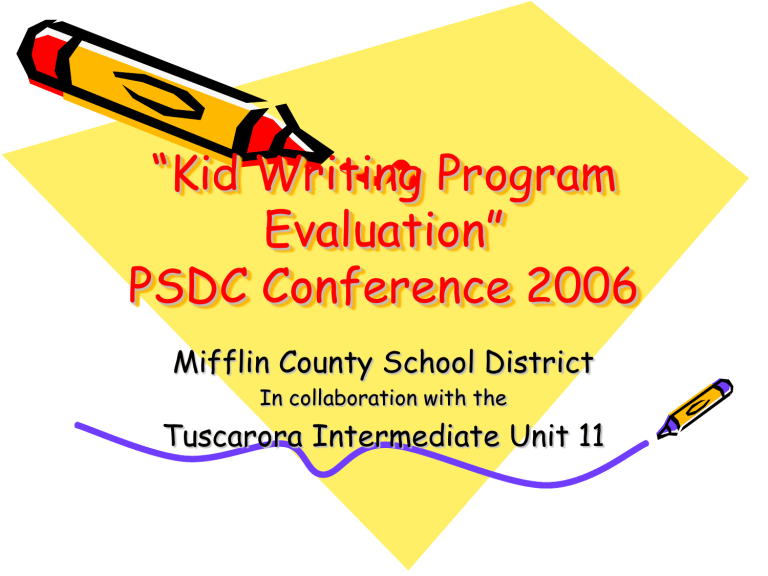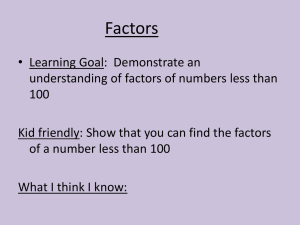“Kid Writing Program Evaluation”

“Kid Writing Program
Evaluation”
PSDC Conference 2006
Mifflin County School District
In collaboration with the
Tuscarora Intermediate Unit 11
Project Inception
• Requested by Mifflin County District
Office Administration
• Specifically, Mr. Runk and Dr.
Czerniakowski expressed interest in the development of an IU Program
Evaluation Model during the summer administrative retreat, 2004.
Program Background
• In late August, Dr. Czerniakowski met with Dr.Tracy Hinish from the
TIU office to develop the timeline for implementation. At that time,
Highland Park Elementary, because of its size and diversity, was identified as the school for the study. It was determined that “Kid Writing” should be the topic of discussion.
Planning Meeting
• On October 20, 2004, an initial planning meeting of the core team members was held at Highland Park
Elementary.
• Goals for the project were determined.
• Questions for exploration were listed.
Core Team Members
• Dr. John Czerniakowski
• Dr. Joe Maginnis
• Dr. Linda Mohler
• Robert Shinskie
• Deb Coble
• Amber Elsesser
• Sharon Grassmyer
• Dottie Peiffer
• Rita Weber
• Beth White
• Tracy Hinish
Additional Members during 05-06
• Kristin Fisher, first grade teacher who replaced Sharon Grassmyer
• Dr. Ken Albaugh, consultant for TIU
11
Questions for
Exploration
• How has Kid
Writing affected older students?
Questions for
Exploration
• What grade specific guidelines/ benchmarks could serve as expectations?
Questions for
Exploration
• How should writing prompts for PSSA preparation be incorporated with
Kid Writing?
Questions for
Exploration
• What role do literacy coaches play in Kid
Writing?
Questions for
Exploration
• How should we report progress for Kid Writing?
Questions for
Exploration
• What reading benefits do students gain as a result of Kid
Writing?
Questions for
Exploration
• How are other districts using Kid
Writing?
Questions for
Exploration
• What are reasonable daily time expectations for Kid Writing?
Questions for
Exploration
• How has students’ writing skills and reading abilities improved as a result of Kid
Writing?
Data Collected
• Longitudinal PSSA data
• Imagination Station
• DIBELS
Data Collected
• Teacher perceptions as per team interview on March 22, 2005
• Student artifacts/portfolios
Title I Reading/Literacy
Coaches
• In December 2005, Title I
Reading/Literacy Coaches were invited to participate.
– Cynthia Smith
– Jennifer Knode
Perceptions Data
Summary
• Reading impact
– Many kindergarten children are reading by the end of K and most identify words.
– Enjoy writing and reading
– K – Guided Reading Level D
– More connectedness between reading, writing, speaking, listening
Reading Impact
– Easier transfers of author’s purpose to writing (using all caps for loud speaking)
– Confidence with writing
– Clear applications to notes, letters, cards, notes to each other
– Smoother grade level transition from kindergarten to second grade
Perceptions Data
Summary
• Challenges
– Helpers/parents volunteers are necessary for kindergarten classes. It would be helpful in other grades as well.
– It is beneficial for the literacy coaches to be involved. This helps a lot.
– Children with speech difficulties have trouble hearing initial sounds.
– Children who have not had exposure to print or writing implements have extreme difficulty.
Perceptions Data
Summary
• Curriculum Challenges:
– All grade level curriculum is more rigorous as a result of Kid Writing.
– There are more opportunities for extended activities at all grade levels due to higher level of sophistication.
Additional Challenges
– Children who move into the district and have had no Kid Writing experience have difficulty.
– Getting students to write to a more sophisticated level of detail presents challenges.
– First year of implementation presented uncertainties for the teachers.
Perceptions Data
Summary
– Second Grade – more rigor in spelling.
– “Maintenance” issues for first grade are already covered.
Perceptions Data
Summary
• Grading Issues:
– Portfolios
– Rubrics
– Developmental Checklists
General Classroom
Observations
• Helpers beneficial in all grade levels
• Literacy coaches beneficial in all grades
• Complete student engagement
• One to one teacher/student contact
• Peer tutors
• Routines established
• Learning centers/stations and other activities are required for classroom management issues once students finish assignments
Classroom Observations
• Student enthusiasm
• Text rich environment
• Positive interactions
• Vocabulary development
• Peer models
• Use of resources for writing
• Problem solving – “What do you do when you get to a word you don’t know how to spell?
Classroom Observations
• Handwriting integrated
• Co-teaching with Title I Reading/Literacy
Coaches
• Get to every child, every day
• Portfolios allow to see growth
• Better parent communication
• Applications of decoding skills
• Individuality
Portfolio Observations
• Teacher/adult editing
• Interest surveys completed with parents
• Word lists
• Student writing
• Evidence of the use of conventions as students progressed through the grade levels
• Expanded vocabulary
Portfolio Observations
• Combination of fiction and nonfiction writings
• Evidence of mapping and Venn
Diagrams
2005-06 School Year
• Developed guidelines and benchmarks for Kid
Writing at Kindergarten, first, and second grade
– Benchmarks for beginning, middle, and end of school year by grade level. Includes skills and expectations for average achievement.
– Guidelines include classroom management tips and student writing samples for K, 1 st , and 2 nd grades
• Comparison of third grade PSSA data with control group and experimental group
2005-06 School Year continued
Networking of TIU member districts who are using Kid Writing
• Continued Professional Development
– District visits
– Writer’s workshop
PSSA Reading
Data Collection Tool
PSSA Performance - Reading
Test Group BB B P A Comments
Gr 3 (03-04) 29 33 24 14 Without Kid Writing/Without Imagination Station
Gr 3 (04-05) 23 17 38 22 With Kid Writing/Limited Imagination Station
Gr 3 (05-06) 14 15 45 26 With Kid Writing/With Imagination Station
35
30
25
20
15
10
5
0
50
45
40
PSSA Reading
Data Collection Tool
Longitudinal 3rd Grade PSSA Reading
BB B
Performance Levels
P A
Gr 3 (03-04)
Gr 3 (04-05)
Gr 3 (05-06)
20
10
0
50
40
30
PSSA Reading
Data Collection Tool
AYP Performance Reading
80
71
70
60
60
38 AYP Performance
Gr 3 (03-04) Gr 3 (04-05) Gr 3 (05-06)
PSSA Math
Data Collection Tool
PSSA Performance - Math
Test Group BB B P A Comments
Gr 3 (03-04) 24 31 30 14 Without Kid Writing/Without Imagination Station
Gr 3 (04-05) 7 24 40 29 With Kid Writing/Limited Imagination Station
Gr 3 (05-06) 6 11 37 46 With Kid Writing/With Imagination Station
35
30
25
20
15
10
5
0
50
45
40
PSSA Math
Data Collection Tool
Longitudinal 3rd Grade PSSA Math
BB B
Performance Levels
P A
Gr 3 (03-04)
Gr 3 (04-05)
Gr 3 (05-06)
30
20
50
40
10
0
PSSA Math
Data Collection Tool
AYP Performance Math
90
83
80
69
70
60
44
Gr 3 (03-04) Gr 3 (04-05) Gr 3 (05-06)
AYP Performance
Questions?
• Comments
Contact Information
• Dr. John Czneriakowski, Assistant Superintendent, Mifflin
County SD
• jjc31@mcsdk12.org
• Dr. Tracy Hinish, Assistant Executive Director, Tuscarora
Intermediate Unit 11
• thinish@tiu11.org
• Dr. Joe Maginnis, Principal,Highland Park Elementary,
Mifflin County SD
• jpm45@mcsdk12.org

